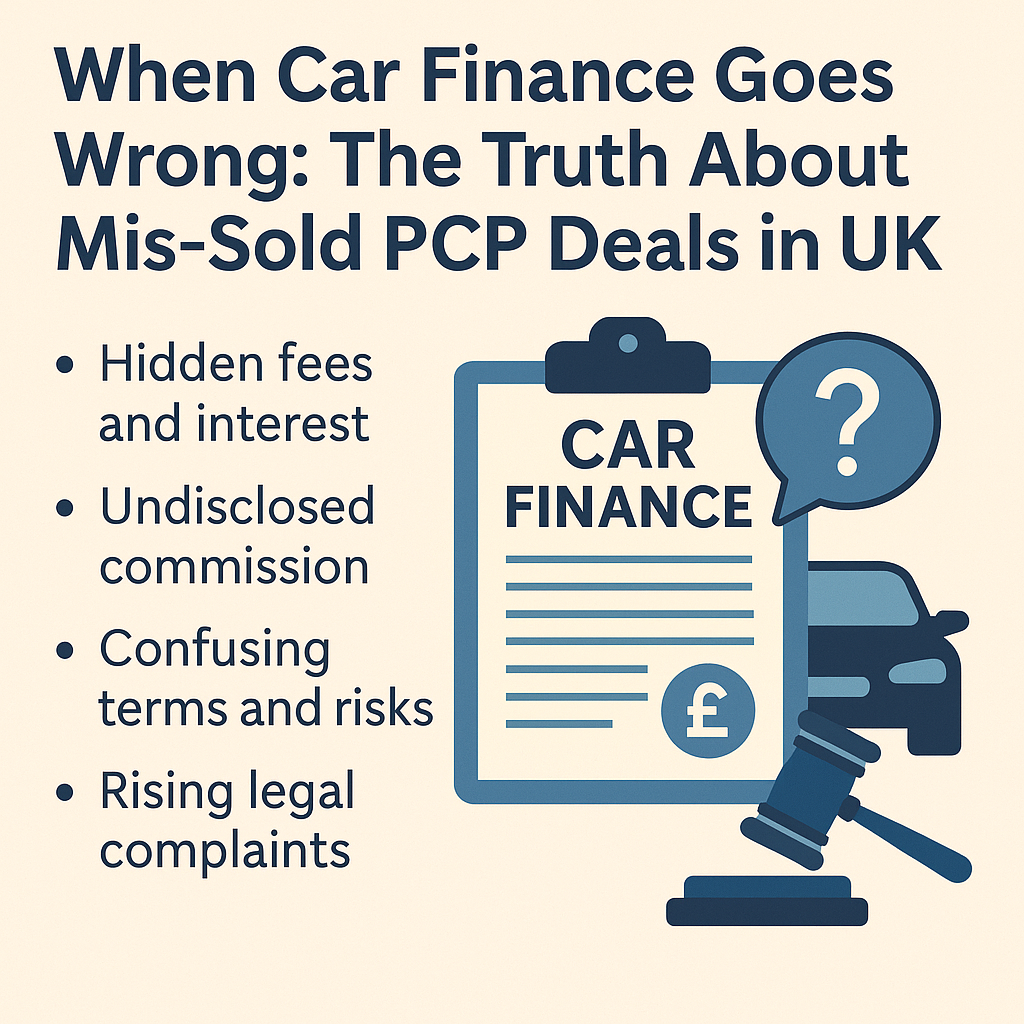Car finance was once seen as a simple, everyday solution. Need a car? Spread the payments, sign the agreement, drive away. For millions of UK drivers, it felt like a straightforward exchange. But beneath the surface of these common deals, many were left with unexpected costs, hidden terms and rising legal concerns. What started as a routine financial decision for some has now turned into one of the country’s most significant mis-selling scandals.
This article unpacks how a widely accepted form of car ownership became a source of frustration, financial stress and growing numbers of mis-sold car finance complaints.
The Normalisation of Complex Finance
Over the past two decades, Personal Contract Purchase (PCP) became one of the most common ways to finance a vehicle in the UK. With lower monthly payments and flexible options at the end of the term, it was marketed as the modern way to own a car.
But many drivers entered these agreements without fully understanding the details. Key terms were often glossed over, commission structures were not always disclosed, and important risks were downplayed. For consumers, the process felt familiar and routine. For sellers, it was a profitable business model.
The problem? A significant number of those everyday transactions did not meet the standards of transparency and fairness.
How Simple Agreements Turn Complicated
A finance agreement should be easy to understand. Yet in many cases, people signed contracts without knowing:
- How much interest they were truly paying
- What would happen at the end of the term
- Whether they could exit the agreement without penalty
- That commission may have influenced the product they were offered
Over time, these oversights created a ticking clock. Once the agreement ended or worse, when repayment became difficult, drivers found themselves locked into terms they had not anticipated.
This has led to a growing wave of PCP claims from consumers who say they were misled or not given the full picture.
Legal Challenges from Routine Choices
The very routine nature of car finance is what makes the current situation so impactful. These were not rare or risky deals. They were offered in mainstream settings to ordinary people, from first-time buyers to long-time motorists.
Yet the fallout has been anything but ordinary.
Legal complaints have emerged due to issues such as:
- Undisclosed commission arrangements
- Pressure selling tactics
- Lack of proper explanation around final balloon payments
- Misrepresentation of ownership terms
- Missing affordability checks
For many, the realisation came only when they were trying to refinance, trade in, or exit their agreement. What they thought was a flexible and transparent deal turned out to be the opposite.
Everyday Mistakes That Lead to Big Problems
Drivers who find themselves in financial difficulty because of a poorly structured deal often say the same thing: “It all seemed normal at the time.”
These are some of the most common mistakes:
- Focusing on monthly payments only: Not calculating the full cost across the term
- Relying on verbal assurances: Failing to read the contract in full
- Accepting optional extras without question: Assuming they were included in the base deal
- Not asking about commission: Assuming the recommendation was impartial
These oversights are not signs of financial recklessness. They are the result of confusing terms, rushed explanations and sales-driven environments.
Why Mis-Sold Car Finance Is Gaining Attention
Mis-selling in the car finance space is not limited to fringe cases. It affects agreements signed between 2007 and 2024, and it spans the full range of vehicles and income levels. That’s why the legal and regulatory focus on this issue continues to intensify.
Drivers are now asking the right questions:
- Was I told about commission arrangements?
- Were the risks and final payment options clearly explained?
- Did I agree to every product or add-on in writing?
- Was the finance genuinely suitable for my needs and budget?
If the answer is no to any of the above, it may signal grounds for a complaint.
Lessons for Drivers Today
Even if your own car finance deal feels manageable, this evolving situation highlights some important lessons for consumers:
- Do not assume normal means safe: Just because something is commonly offered does not make it fair
- Always ask for documentation: Get written explanations and compare multiple options
- Take time to read: Never rush into a financial agreement, no matter how familiar it seems
- Keep records: Emails, brochures, notes and screenshots all help protect your interests
If a deal feels too good to be true or is difficult to explain in plain terms, there is usually a reason for that.
The Human Impact of Legal Missteps
For many people, mis-sold car finance is not just a paperwork issue. It has had a real impact on lives:
- People stuck in unaffordable deals without a clear way out
- Drivers whose vehicles are worth far less than expected at the end of the term
- Households juggling repayments they did not expect
- Consumers with damaged credit scores from agreements they did not fully understand
The emotional toll of these situations should not be underestimated. For something that was meant to provide freedom, the aftermath has left many feeling trapped.
What Can Be Done?
If you suspect you were affected, the first step is to check your documents. Agreements signed between 2007 and 2024 may be eligible for review. Look out for vague language, missing disclosures and unclear payment terms.
If anything feels off, it is worth investigating further. A large number of mis-sold car finance cases have already been identified, and many more are under review. Submitting a claim does not guarantee success, but it can offer a path toward resolution if your experience was unfair.
Final Thoughts
What makes this issue so significant is not just the financial loss, but the fact that it came from something that felt normal. Car finance was marketed as a simple, everyday product. But for many drivers, it became a long-term liability they did not sign up for knowingly.
The rise in PCP claims and legal complaints reveals how widespread the problem really is. Everyday decisions can have lasting effects especially when transparency is missing.
As more cases come to light, the focus must remain on clarity, honesty and consumer education. Finance should never be a mystery. It should be a tool that works for the buyer, not against them.










